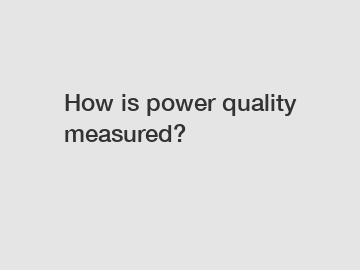How is power quality measured?
Link to SUIN
Have you ever wondered how power quality is measured? Well, you're in luck! In this article, we will explore the different methods used to measure power quality and why it is important for both consumers and suppliers. So, grab a cup of coffee, sit back, and let's dive right in!
What is power quality?

Power quality refers to the characteristics of electricity that affect the way it behaves in an electrical system. These characteristics include voltage level, frequency, harmonics, and interruptions. When power quality is poor, it can lead to equipment failures, data loss, and even fires. That's why measuring power quality is crucial for ensuring a safe and reliable supply of electricity.
Voltage level.
One of the most important aspects of power quality is voltage level. Voltage is the pressure of electricity flowing through a circuit, and it needs to be within a certain range to ensure that equipment operates correctly. Measuring voltage level involves using a voltmeter to check the voltage at various points in an electrical system.
Frequency.
Another key aspect of power quality is frequency. Frequency refers to the number of cycles per second in an alternating current (AC) system. In most countries, the standard frequency is 50 or 60 Hertz (Hz). Measuring frequency involves using a frequency meter to check the number of cycles per second in an electrical system.
Harmonics.
Harmonics are distortions in the AC waveform that can cause interference with electrical equipment. To measure harmonics, a power quality analyzer is used to analyze the waveform and identify any distortions. By measuring harmonics, suppliers can ensure that electricity is delivered in a clean and reliable manner.
Interruptions.
Interruptions in power supply can be caused by a variety of factors, including weather events, equipment failures, and human error. Measuring interruptions involves tracking the duration and frequency of power outages using a power quality monitor. By monitoring interruptions, suppliers can identify areas for improvement and take corrective actions to minimize downtime.
Why is power quality measurement important?
Measuring power quality is important for both consumers and suppliers. For consumers, poor power quality can lead to equipment failures, data loss, and safety hazards. By measuring power quality, consumers can identify issues early on and take steps to protect their equipment and data.
For suppliers, ensuring good power quality is essential for maintaining a reliable supply of electricity. By measuring power quality, suppliers can identify areas for improvement and take proactive measures to enhance the reliability of their electrical systems.
In conclusion, power quality measurement is crucial for ensuring a safe and reliable supply of electricity. By measuring voltage level, frequency, harmonics, and interruptions, suppliers can identify issues early on and take corrective actions to improve power quality. If you have any questions about power quality measurement, feel free to contact us, and our team will be happy to assist you. Remember, a reliable supplier is key to maintaining good power quality for your electrical systems.
Please visit our website for more information on this topic.
If you want to learn more, please visit our website high frequency generator products series.



